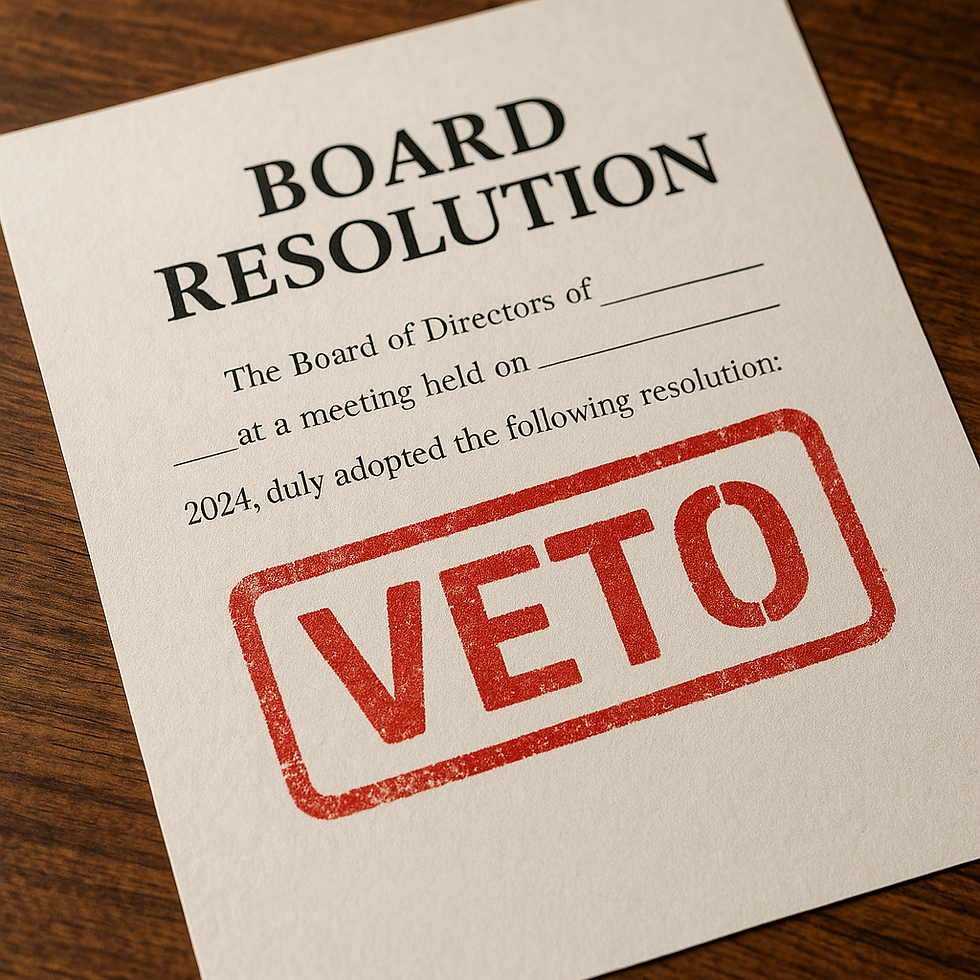Understanding Majority Shareholder Oppression: Common Tactics Used Against Minority Shareholders
- Evan Howard
- Apr 24, 2025
- 4 min read
When you invest in a company as a minority shareholder, you expect fair treatment, transparency, and a voice in major decisions. Unfortunately, the reality can sometimes be very different. Majority shareholders—those who control more than half of a company’s voting power—hold significant sway over corporate affairs. While most act in good faith, some use their power to sideline, pressure, or even force out minority shareholders.
What Is Majority Shareholder Oppression?
Majority shareholder oppression refers to actions taken by controlling shareholders that unfairly prejudice or harm minority shareholders. These tactics can range from subtle exclusion to outright financial pressure. The goal is often to force minority shareholders to sell their shares at a low price, remove them from management, or deprive them of their fair share of company profits.

Squeeze-Outs and Freeze-Outs: The Classic Tactic
One of the most notorious tactics is the “squeeze-out” or “freeze-out.” In this scenario, majority shareholders use their control to force minority shareholders to sell their shares—often at an unfavorable price. This can happen through mergers, restructurings, or amendments to company bylaws. The minority is left with little choice but to accept the buyout, losing both their investment and their voice in the company.
Employment Termination and Exclusion from Management
Many minority shareholders are also company employees or serve on the board. Majority shareholders may terminate their employment or remove them from management positions, stripping them of both income and influence. This tactic is especially common in closely held corporations and family businesses.
Financial Squeeze: Withholding Dividends and Diluting Shares
Another common move is the refusal to declare dividends. By withholding profits, the majority can apply financial pressure on minority shareholders, making it harder for them to hold onto their shares. Similarly, issuing new shares to dilute minority ownership is a powerful way to reduce their voting power and share of future profits.
Denial of Information and Voting Rights
Transparency is a cornerstone of good corporate governance. Yet, majority shareholders sometimes deny minorities access to essential company records and financial statements. In extreme cases, they may even block minority shareholders from voting on key issues, further eroding their influence.
Self-Dealing and Nepotism
Majority shareholders might engage in self-dealing—conducting transactions that benefit themselves at the expense of the company and its minority owners. This can include awarding themselves excessive compensation, diverting company income for personal use, or hiring family members over more qualified candidates (nepotism). These actions drain company resources and diminish the value of minority shares.
Usurpation of Corporate Opportunities
Sometimes, majority shareholders will take business opportunities for themselves rather than letting the company (and all its shareholders) benefit. This is a clear breach of fiduciary duty and can have a lasting negative impact on the company’s growth and the value of minority shares.
Manipulation of Corporate Governance
Finally, majority shareholders may manipulate the rules of corporate governance—skipping proper votes, wrongfully terminating agreements that benefit minorities, or otherwise bending the rules to suit their interests.
What Can Minority Shareholders Do?
If you suspect you’re being targeted by oppressive tactics, it’s important to act quickly. Document every incident, request access to company records, and consult with a legal professional experienced in shareholder rights. Many states, including Delaware and North Carolina, have robust legal protections for minority shareholders, and courts are increasingly willing to intervene when majority shareholders cross the line.
Majority shareholder oppression is a serious issue that can undermine trust, destroy value, and even threaten the survival of a company. By understanding the tactics used and knowing your rights, you can better protect your investment and ensure your voice is heard. If you’re facing any of these challenges, don’t hesitate to seek legal advice—your rights as a shareholder matter.
Common Majority Shareholder Actions Against Minority Shareholders
Action | Brief Definition |
Squeeze-Out / Freeze-Out | Forcing minority shareholders to sell their shares, often through mergers or restructuring. |
Termination of Employment | Firing minority shareholders who are also employees to pressure them to sell or relinquish rights. |
Refusal to Declare Dividends | Withholding dividends to financially pressure minority shareholders. |
Denial of Access to Information | Blocking minority shareholders from viewing company records or financials. |
Share Dilution | Issuing new shares to dilute the minority’s ownership percentage and voting power. |
Exclusion from Management | Preventing minority shareholders from participating in management or key decisions. |
Excessive Compensation | Majority pays themselves excessive salaries, reducing profits available to minorities. |
Income Diversion | Redirecting company profits for personal benefit of majority, excluding minorities. |
Nepotism | Hiring family or associates of the majority, disadvantaging minority shareholders. |
Unfair Related-Party Transactions | Engaging in self-dealing that benefits the majority at the expense of the minority. |
Blocking Voting Rights | Preventing minorities from voting on matters where they are entitled. |
Wrongful Termination of Agreements | Cancelling contracts or agreements that benefit minority shareholders. |
Usurpation of Corporate Opportunity | Majority takes business opportunities for themselves, excluding the company/minorities. |
Failure to Conduct Proper Votes | Skipping or manipulating formal votes to sideline minority interests. |
Howard Law is a business and M&A law firm in the greater Charlotte, North Carolina area, with additional services in M&A advisory and business brokerage. Howard Law is a law firm based in the greater Charlotte, North Carolina area focused on business law, corporate law, mergers & acquisitions, M&A advisor and business brokerage. Handling all business matters from incorporation to acquisition as well as a comprehensive understanding in assisting through mergers and acquisition. The choice of a lawyer is an important decision and should not be based solely on advertisements. The information on this website is for general and informational purposes only and should not be interpreted to indicate a certain result will occur in your specific legal situation. Information on this website is not legal advice and does not create an attorney-client relationship. You should consult an attorney for advice regarding your individual situation. Contacting us does not create an attorney-client relationship. Please do not send any confidential information to us until such time as an attorney-client relationship has been established.



Comments